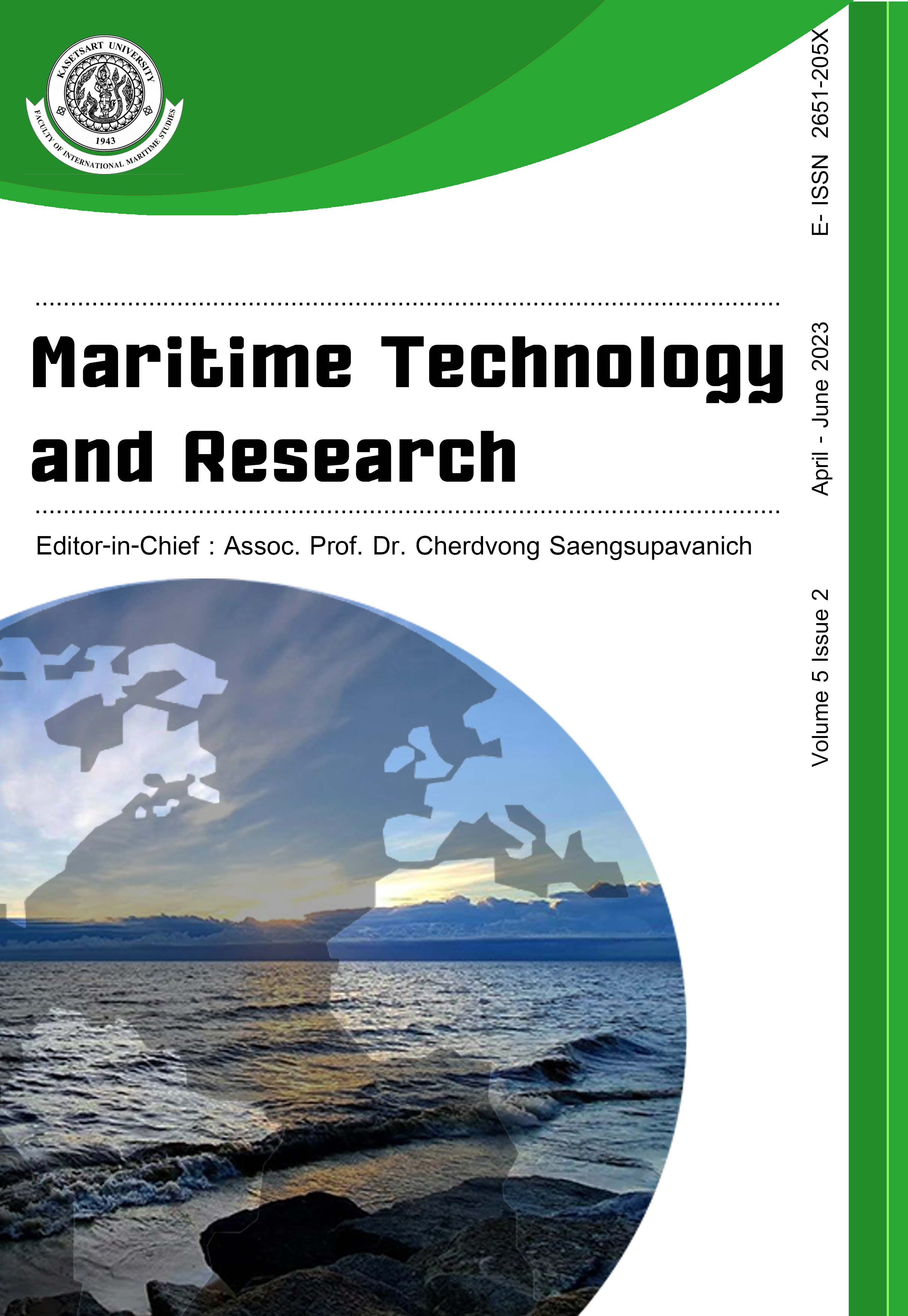Concerns regarding infectious disease prevention: An issue for maritime management
DOI:
https://doi.org/10.33175/mtr.2023.262682Keywords:
Maritime, Infectious disease, PreventionAbstract
A frequent issue in medicine is infectious disease. It is feasible for infectious diseases to spread to other locations. A prospective breakout of an infectious disease among seafarers on board must be addressed carefully for the sake of maritime safety. The authors of this article provide a summary of infectious disease prevention. In this mini review, relevant reports are summarized and discussed.
------------------------------------------------------------------------------
Cite this article:APA Style:
Joob, B., & Wiwaitkit, V. (2023). Concerns regarding infectious disease prevention: An issue for maritime management. Maritime Technology and Research, 5(2), 262682. https://doi.org/10.33175/mtr.2023.262682
MDPI Style:
Joob, B.; Wiwaitkit, V. Concerns regarding infectious disease prevention: An issue for maritime management. Marit. Technol. Res. 2023, 5(2), 262682. https://doi.org/10.33175/mtr.2023.262682
Vancouver Style:
Joob B, Wiwaitkit V. (2023). Concerns regarding infectious disease prevention: An issue for maritime management. Marit. Technol. Res. 5(2): 262682. https://doi.org/10.33175/mtr.2023.262682
------------------------------------------------------------------------------
Highlights
- Maritime workers must work long hours and must be concerned about their health
- Infectious disease is a common issue, and maritime workers are at risk of contracting it
- There are many possible infectious diseases among maritime workers
- Prevention of infectious diseases among maritime workers is needed
- It is necessary to develop guidelines for infection prevention and control in maritime activities
References
Brotherton, J. M., Delpech, V. C., Gilbert, G. L., Hatzi, S., Paraskevopoulos, P. D., McAnulty, J. M., & Cruise Ship Outbreak Investigation Team. (2003). A large outbreak of influenza A and B on a cruise ship causing widespread morbidity. Epidemiology and Infection, 130(2), 263-271. https://doi.org/10.1017/S0950268802008166
Cancellotti, F. M. (1995). Aircraft and ship disinfection. Revue Scientifique et Technique, 14(1), 177-189. https://doi.org/10.20506/rst.14.1.834
Control and Prevention (CDC). (2001). Influenza B virus outbreak on a cruise ship-Northern Europe, 2000. JAMA, 50(8), 137-140.
Conigliaro, P., Triggianese, P., Ballanti, E., Perricone, C., Perricone, R., & Chimenti, M. S. (2019). Complement, infection, and autoimmunity. Current Opinion in Rheumatology, 31(5), 532-541. https://doi.org/10.1097/BOR.0000000000000633
Dahl, E. (2011). Wound infections on board ship-prevention, pathogens, and treatment. International Maritime Health, 62(3), 186-190.
Egger, G., Swinburn, B., & Rossner, S. (2003) Dusting off the epidemiological triad: Could it work with obesity? Obesity Review, 4(2), 115-119. https://doi.org/10.1046/j.1467-789X.2003.00100.x
Fernandes, E. G., de Souza, P. B., de Oliveira, M. E., Lima, G. D., Pellini, A. C., Ribeiro, M. C., Sato, H. K., Ribeiro, A. F., & Yu, A. L. (2014). Influenza B outbreak on a cruise ship off the São Paulo Coast, Brazil. Journal of Travel Medicine, 21(5), 298-303. https://doi.org/10.1111/jtm.12132
Guilamo-Ramos, V., Thimm-Kaiser, M., Benzekri, A., Hidalgo, A., Lanier, Y., Tlou, S., de Lourdes Rosas López, M., Soletti, A. B., & Hagan, H. (2021). Nurses at the frontline of public health emergency preparedness and response: Lessons learned from the HIV/AIDS pandemic and emerging infectious disease outbreaks. Lancet Infectious Disease, 21(10), e326-e333. https://doi.org/10.1016/S1473-3099(20)30983-X
Hillion, S., Arleevskaya, M. I., Blanco, P., Bordron, A., Brooks, W. H., Cesbron, J. Y., Kaveri, S., Vivier, E., & Renaudineau, Y. (2020). The innate part of the adaptive immune system. Clinical Review in Allergy and Immunology, 58(2), 151-154. https://doi.org/10.1007/s12016-019-08740-1
Horneland, A. M. (2009). Maritime telemedicine: Where to go and what to do. International Maritime Health, 60(1-2), 36-39.
Idnani, N. (2010). Varicella among seafarers: A case study on testing and vaccination as a cost-effective method of prevention. International Maritime Health, 61(1), 32-35.
Inoue, T., Moran, I., Shinnakasu, R., Phan, T. G., Kurosaki, T. (2018). Generation of memory B cells and their reactivation. Immunologu Review, 283(1), 138-149. https://doi.org/10.1111/imr.12640
McKay, M. P. (2007). Maritime health emergencies. Occupational Medicine, 57(6), 453-455. https://doi.org/10.1093/occmed/kqm053
Mulić, R., Vidan, P., & Polak, N. K. (2010). HIV infection among seafarers in Croatia. International Maritime Health, 62(4), 209-214.
Pougnet, R., Bleunven, P., Loddé, B., Lucas, D., Dewitte, J. D., & Pougnet, L. (2020). Sexually transmitted infection and seafarers: Raising awareness on preventing prostitution? International Maritime Health, 71(4), 303. https://doi.org/10.5603/IMH.2020.0054
Pougnet, R., Pougnet, L., Allio, I., Lucas, D., Dewitte, J. D., & Loddé, B. (2018). Maritime environment health risks related to pathogenic microorganisms in seawater. International Maritime Health, 69(1), 35-45. https://doi.org/10.5603/IMH.2018.0006
Pro Capitulo, K. L., Korniewicz, D. M., & Baldwin, C. M. (2012). Are emerging infectious diseases the most significant global health concern for nurses? MCN American Journal of Maternal Child Nursing, 37(5), 288. https://doi.org/10.1097/NMC.0b013e31825ecd0f
Ricci, G., Pirillo, I., Rinuncini, C., & Amenta, F. (2014). Medical assistance at the sea: Legal and medico-legal problems. International Maritime Health, 65(4), 205-209. https://doi.org/10.5603/IMH.2014.0039
Rokicki, M., Sikorska, K., Sulima, M., & Gesing, M. (2022). Reactivation of hepatitis B virus infection in a seafarer: An omitted problem of maritime medicine. International Maritime Health, 73(2), 77-82. https://doi.org/10.5603/IMH.2022.0012
Rooney, R. M., Cramer, E. H., Mantha, S., Nichols, G., Bartram, J. K., Farber, J. M., & Benembarek, P. K. (2004). A review of outbreaks of foodborne disease associated with passenger ships: Evidence for risk management. Public Health Report, 119(4), 427-434. https://doi.org/10.1016/j.phr.2004.05.007
Schlaich, C. C., Lucas, K., Sydow, S., Beyer, E., & Faesecke, K. P. (2021). Procedural aspects of COVID-19 vaccinations for seafarers on ocean-going vessels. International Maritime Health, 72(3), 179-182. https://doi.org/10.5603/MH.2021.0034
Schlaich, C., Reinke, A., Savenich, C., Reimer, T., Oldenburg, M., Baur, X., Horneland, A., Jaremin, B. M., Nielsen, P. S., Wichtmann, E. M., Ioannidis, N., Brandal, L., Puskeppeleit, M., Denisenko, I., Carter, T., & Nikolić, N. (2009). Guidance to the International Medical Guide for Ships 3rd edition: Interim advice regarding the best use of the medical chest for ocean-going merchant vessels without a doctor onboard: Joint statement of WHO Collaborating Centres for the health of seafarers and the International Maritime Health Association - 2009 version. International Maritime Health, 60(1-2), 51-66.
Singh, V. P., Proctor, S. D., & Willing, B. P. (2016). Koch’s postulates, microbial dysbiosis and inflammatory bowel disease. Clinical Microbiology and Infection, 22(7), 594-599. https://doi.org/10.1016/j.cmi.2016.04.018
Sossai, P., Uguccioni, S., Mela, G. S., DiCanio, M., & Amenta, F. (2020) Coronavirus variant COVID-19 pandemic: A report to seafarers. International Maritime Health, 71(3), 191-194. https://doi.org/10.5603/IMH.2020.0034
Taylor, T. L., Maguire, D., & Johansson, M. (2022). Implementation of an onboard COVID-19 vaccination programme: A university partnership to vaccinate seafarers. International Maritime Health, 73(2), 59-63. https://doi.org/10.5603/IMH.2022.0009
Thisted, R. A. (2003). Are there social determinants of health and disease? Perspective in Biological Medicine, 46(3S), S65-S73. https://doi.org/10.1353/pbm.2003.0062
Tomaszunas, S. (1986). Tetanus prevention in seafarers. Bulletin of the Institute of Maritime and Tropical Medicine, 37(1-2), 113-119.
Young, B. E., & Wilder-Smith, A. (2018). Influenza on cruise ships. Journal of Travel Medicine, 25(1), tay146. https://doi.org/10.1093/jtm/tay146
Downloads
Published
Issue
Section
License
Copyright (c) 2023 Maritime Technology and Research

This work is licensed under a Creative Commons Attribution-NonCommercial-NoDerivatives 4.0 International License.
Copyright: CC BY-NC-ND 4.0








